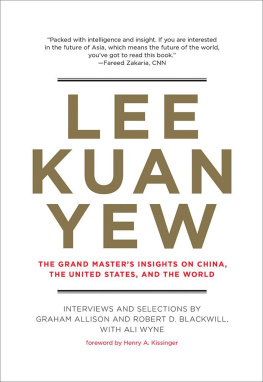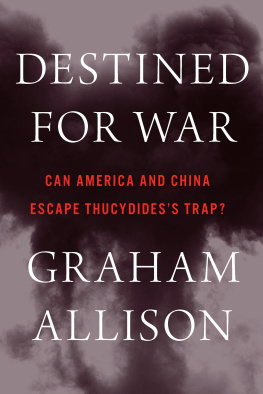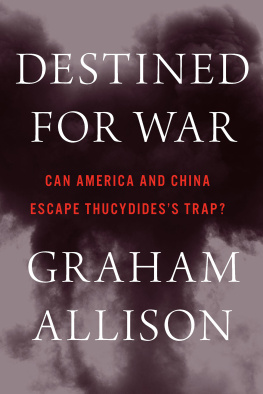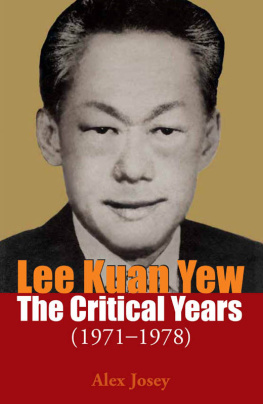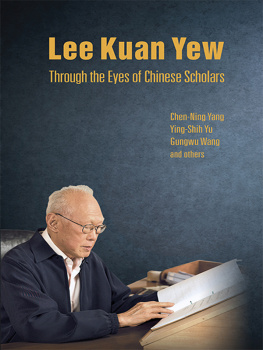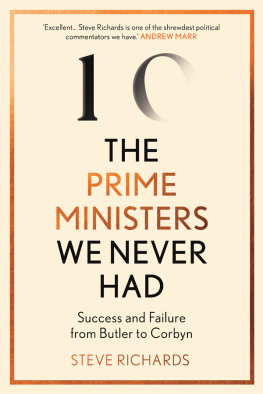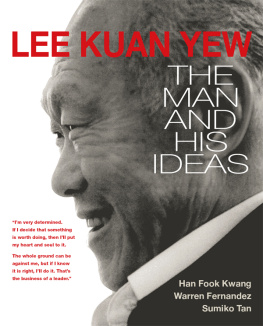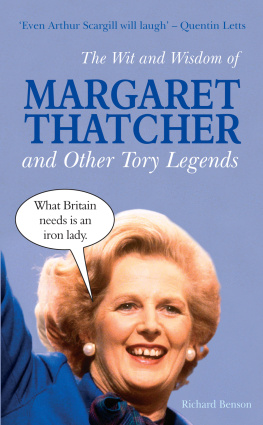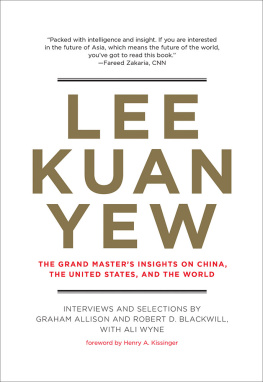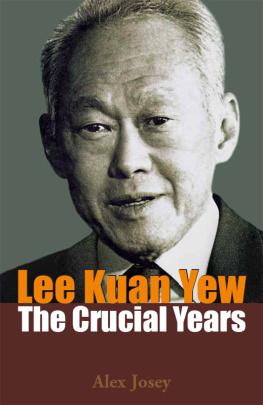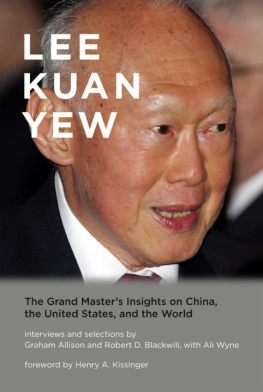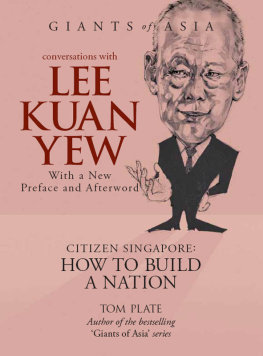Lee Kuan Yew
The Belfer Center Studies in International Security book series is edited at the Belfer Center for Science and International Affairs at the Harvard Kennedy School and is published by The MIT Press. The series publishes books on contemporary issues in international security policy, as well as their conceptual and historical foundations. Topics of particular interest to the series include the spread of weapons of mass destruction, internal conflict, the international effects of democracy and democratization, and U.S. defense policy. A complete list of Belfer Center Studies appears .
Lee Kuan Yew
The Grand Masters Insights on China, the United States, and the World
Interviews and Selections by
Graham Allison and Robert D. Blackwill
with Ali Wyne
Foreword by Henry A. Kissinger
Belfer Center Studies in International Security
The MIT Press
Cambridge, Massachusetts
London, England
2013 Belfer Center for Science and International Affairs
All rights reserved. No part of this book may be reproduced in any form by any electronic or mechanical means (including photocopying, recording, or information storage and retrieval) without permission in writing from the publisher.
Library of Congress Cataloging-in-Publication Data
Lee, Kuan Yew, 1923 [Interviews. Selections]
Lee Kuan Yew : the grand master's insights on China, the United States, and the world / interviews and selections by Graham Allison and Robert D. Blackwill ; with Ali Wyne ; foreword by Henry A. Kissinger.
p. cm. (Belfer center studies in international security)
Includes bibliographical references and index.
ISBN 978-0-262-01912-5 (hardcover : alk. paper)
ISBN 978-0-262-31274-5 (retail e-book)
1. World politics. I. Allison, Graham T. II. Blackwill, Robert D. III. Wyne, Ali, 1987 IV. Title.
D31.L44 2013
303.4909'0512dc23
2012032250
10 9 8
Contents
Foreword
I have had the privilege of meeting many world leaders over the past half century; none, however, has taught me more than Lee Kuan Yew, Singapores first premier and its guiding spirit ever since. As to the ancient argumentwhether individuals shape events or are their registerthere can be no doubt about the answer with regard to Lee Kuan Yew, a man of unmatched intelligence and judgment.
By far the smallest country in Southeast Asia, Singapore seemed destined to become a client state of more powerful neighbors, if indeed it could preserve its independence at all. Lee thought otherwise. His vision was of a state that would not simply survive, but prevail by excelling. Superior intelligence, discipline, and ingenuity would substitute for resources. He summoned his compatriots to a duty that they had never previously perceived: first to clean up their city, then to dedicate it to overcome the initial hostility of their neighbors and their own ethnic divisions by superior performance. The Singapore of today is his testament.
When Lee took over, per capita income was about $400 a year; it is now more than $50,000. He inspired his polyglot population to become the intellectual and technical center of the Asia-Pacific. Because of his leadership, a medium-sized city has become a significant international and economic player, especially in fostering multilateral transpacific ties.
Along the way, Lee has made himself an indispensable friend of the United States, not primarily by the power he represents, but by the excellence of his thinking. His analysis is of such quality and depth that his counterparts consider meeting with him as a way to educate themselves. For three generations now, whenever Lee comes to Washington, he meets with an array of people spanning the top ranks of the American government and foreign policy community. His discussions occur in an atmosphere of rare candor borne of high regard and long-shared experience. Every American president who has dealt with him has benefited from the fact that, on international issues, he has identified the future of his country with the fate of the democracies. Furthermore, Lee can tell us about the nature of the world that we face, with especially penetrating insights into the thinking of his region.
Lees analyses shed light on the most important challenge that the United States confronts over the long term: how to build a fundamental and organic relationship with Asia, including China. There is nobody who can teach us more about the nature and the scope of this effort than Lee Kuan Yew. As this book demonstrates, however, his insights extend far beyond U.S.-China relations; they encompass virtually every challenge of international relations. It will not take long for readers to discover why Lee is not only one of the seminal leaders of our period, but also a thinker recognized for his singular strategic acumen.
Henry A. Kissinger
New York, April 2012
Who Is Lee Kuan Yew?
A strategists strategist
A leaders leader
A mentors mentor
When Lee Kuan Yew Talks, Who Listens?
Presidents
Barack Obama, president of the United States
Lee is one of the legendary figures of Asia in the 20th and 21st centuries. He is somebody who helped to trigger the Asian economic miracle. (October 29, 2009)
Bill Clinton, 42nd president of the United States
Lees life of public service is both unique and remarkableHis work as Prime Minister and now as Minister Mentor has helped literally millions of people in Singapore and all across Southeast Asia to live better, more prosperous lives. I hope the leaders of ASEAN [the Association of Southeast Asian Nations] will continue to build upon Mr. Lee Kuan Yews outstanding legacyI thank you [the U.S.-ASEAN Business Council] for honoring a man I admire so very much. (October 27, 2009)
George H. W. Bush, 41st president of the United States
In my long life in public service, I have encountered many bright, able people. None is more impressive than Lee Kuan Yew. (endorsement of Lees My Lifelong Challenge: Singapores Bilingual Journey, 2011)
Jacques Chirac, president of France (19952007)
Lee Kuan Yew has gathered around himself the most brilliant minds, transforming the most exacting standards into a system of government. Under his leadership, the primacy of the general interest, the cult of education, work and saving, and the capacity to foresee the needs of the city have enabled Singapore to take what I call shortcuts to progress. (endorsement of Lees From Third World to First: The Singapore Story: 19652000, 2000)
F. W. de Klerk, president of South Africa (198994)
The leader who, perhaps, impressed me most was Lee Kuan Yew of SingaporeHe was an individual who changed the course of historyLee Kuan Yew took the right decisions for his country; he chose the right values and the right economic policies to ensure the development of a successful society. In this, he was an artist painting on the largest canvas that society can provide. He was also a very astute judge of the world and provided a very canny and realistic assessment of our situation in South Africa when I met him during the early nineties. (March 30, 2012)
Chinese Leaders
Xi Jinping, likely incoming president of China
Lee is our senior who has our respect: To this day, you are still working tirelessly to advance our bilateral relationship, and you have my full admiration. We will never forget the important contribution you have made to our bilateral relationship. (May 23, 2011)

